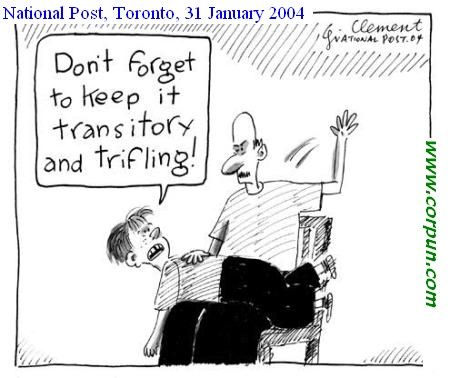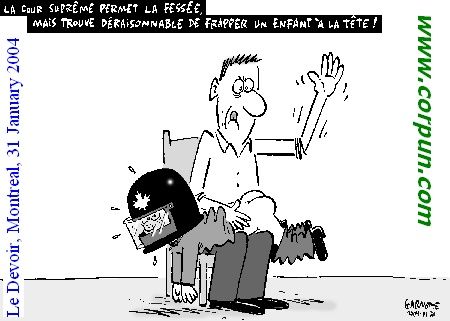|
Toronto Star, 31 January 2004Top court upholds spanking lawIn 6-3 decision, court rejects claim that law violation of children's rightsFrom Canadian Press
OTTAWA (CP) - Parents shouldn't face criminal charges for every little smack delivered to a child's bottom, says the Supreme Court of Canada. But teachers would be risking an assault conviction if they try the same thing in a classroom. Parents could meet the same fate if they carry their discipline beyond the limits set out by the high court today. In a 6-3 judgment, the court upheld the so-called spanking law, first enacted by the federal government more than a century ago, which permits the use of "reasonable" physical force to discipline children. But the decision laid down new rules to guide lower-court judges -- as well as parents -- in deciding what's reasonable. Chief Justice Beverley McLachlin, writing for the majority, ruled out the use of corporal punishment for children under age two or for teenagers. She also found it unreasonable to use implements other than the open hand, like rulers or belts, or to strike a child on the face or head. The general rule, said McLachlin, is that corporal punishment must be limited to "minor corrective force of a transitory and trifling nature." The court also drew a distinction between parents and teachers, revising legal doctrine that had lumped them together. The weight of current expert evidence and social thinking is that "corporal punishment by teachers is unacceptable," wrote McLachlin. That was a new judicial reading of Section 43 of the Criminal Code, the latest version of a law that has been on the books in one form or other since 1892. It provides that neither parents nor teachers can be found guilty of assault for physically correcting a child, as long as the force used is "reasonable in the circumstances." McLachlin said the proper interpretation is that teachers can use limited force to restrain unruly students -- for example, to remove them from a classroom or break up a fight -- but can't hit them. The Canadian Teachers Federation said it doesn't know of any public schools in Canada that still employ corporal punishment, although it is used by some private and religious schools. Federation president Terry Price said her group agrees students shouldn't be hit, but is glad the court recognized the need for physical restraint in "unusual instances." The spanking law had been challenged by the Canadian Foundation for Children, Youth and the Law, a Toronto-based children's advocacy group. The foundation argued Section 43 was discriminatory, infringed the right of children to security of the person, and opened the door to cruel and unusual punishment. "We're obviously disappointed," said Cheryl Milne, a lawyer for the group. She did take took solace in the new guidelines that set strict limits on the use of force. "It's a better judgment than the courts below, so we have gained some ground." Michael Martens of Focus on the Family, one of several conservative lobby groups that defended the spanking law, welcomed the judgment as a victory for parental autonomy. "We are extremely encouraged," said Martens. "We believe the courts have affirmed . . . that spanking is clearly not abuse." The ruling also won favour with 13-year-old Victoria Whaley, who dropped into the court with parents Brent and Paula, members of a home schooling group that argued in support of the law. "I agree that it should be upheld," said Victoria, who admitted to being spanked when she was younger. "I know that my parents always love me and that I've always been safe." Peter Dudding, director of the Child Welfare League of Canada, took a different view. He saw the judgment as a "worst case scenario" and predicted the court's guidelines would fail to protect children against parental excess. "The evidence is clear in terms of the use of physical punishment - it's harmful to children," said Dudding, whose group will continue to lobby the federal government to repeal the law. The three judges in the minority today were also skeptical about the rules established by their colleagues. Justice Louise Arbour listed numerous cases in which lower courts had acquitted adults of assault charges against youngsters. Among the incidents: - Two girls, aged 13 and 14, stripped to their underwear and strapped with a belt by their aunt and uncle. - A 15-year-old boy punched and knocked to the floor by his father. - An 8-year-old boy kicked by his father for spilling a package of sunflower seeds. - A pair of 2-year-olds and a 3-year-old hit with a belt by their foster mother. "Canadian courts have been unable to articulate a legal framework for Section 43 despite (past) attempts to establish guidelines," wrote Arbour, who thought the law should have been struck down. Roslyn Levine, a lawyer for the federal Justice Department, insisted the latest rules will put an end to the kind of verdicts cited by Arbour. "It will create a national standard," said Levine. "We now have very clear guidelines . . . . That's what the federal government was looking for in this case." Legal Notice: Copyright Toronto Star Newspapers Limited. All rights reserved. 
by Corrigan in The Toronto Star
The London Free Press, London, Ontario, 31 January 2004Spanking ruling correct compromiseBy Larry Cornies
Social workers and child-protection workers, who see the very worst cases of child assault and abuse among us and are forced to intervene, have already dubbed yesterday a sad day for Canadian children. But personally, I believe the Supreme Court's judgment in dismissing the Charter challenge brought by the Canadian Foundation for Children, Youth and the Law, a Toronto-based children's advocacy group, was the correct one. It was correct because it preserved and protected the right of parents, teachers and other caregivers to apply mild, coercive force against children, as a last resort, without eventually criminalizing them. It was correct because it reaffirmed the long-adhered-to constraints within the Criminal Code -- that corrective force used against children must be "reasonable," an admitted ambiguous phrase, but which, in itself, presumes that most of us know what "unreasonable" looks and sounds like. It was correct because it included guidelines for the benefit of lower courts and those of us who can't intuitively sense what is reasonable and what is not: that corporal punishment outside the ages of about three to 11 is highly questionable; that the use of implements such as belts are out; that striking a child or applying coercive force anywhere on the face or head is a misuse of authority and responsibility. And it was correct in that it carefully distinguished the roles of parent and teacher, where the former may use "minor corrective force of a transitory and trifling nature" to punish, the latter may not. Until yesterday, the roles of the two were assumed under the law to be nearly identical. It is not open season on Canadian children. Quite the opposite. Yesterday's 6-3 judgment clarifies for us all what the courts should deem "reasonable" -- and the Supreme Court's definitions range not far from what most of us would, logically and viscerally, consider such. When clarifications by courts accomplish that, our shared sense of what our norms, in this case with respect to child-rearing, are strengthened. In the words of Roslyn Levine, the federal Justice Department lawyer involved in the case, "it will create a national standard . . . We now have very clear guidelines . . . . It tells parents where the boundaries are." Those are the legal merits of yesterday's decision. But there are other points I'd like to make from the more personal perspective of a parent. We live in a society that's trending toward 1.5 children per family. As a father of four, therefore, I'm part of a fairly exclusive club (it tends to be expensive and membership in it, once entered, commits you for 20 years or more. Golf-club memberships pale by comparison). In conversations with other parents inside the three-children-plus club, one common theme emerges: parenting tends to improve with practice. There is no great surprise in this fact, but it does have implications for how our nation's children are raised -- and disciplined -- and perhaps even how they turn out. I say "perhaps" on the latter count, because another of the truisms I've learned, over my sometimes ham-fisted parenting and life-coaching career, is that children are incredibly understanding, resilient and forgiving. As they grow, they tend to endure and forgive parental mistakes if they're certain love and good intent underlie the effort. Conversely, they will not forgive -- and will long suffer the effects from -- indifference, selfishness, resentment or hostility. Children, even at an early age, can recognize whether discipline -- including the mild, coercive type of which the Court spoke yesterday -- is well-intentioned or the result of anger, the need to control, or a bankruptcy of parenting strategies. Ask any successful teacher. Almost all of them can tell a story of at least one freshman colleague whose career flamed out because they reached too early and too often for the ultimate "remedies" of classroom anger, detentions or expulsion, partly, at least, out of a paucity of ideas on how to deal with kids more creatively and constructively. Our aim should be to supplement yesterday's judgment by the Supreme Court with many more opportunities for parents to learn the art and absorb the strategies of successful parenting. On this score, we've probably only just scratched the surface in creating the safe and secure environments kids need to thrive. Larry Cornies is Editor of The London Free Press. His column appears Saturdays. Copyright © The London Free Press 2001,2002,2003
National Post, Toronto, 31 January 2004
Calgary Sun, Alberta, 31 January 2004Spanking newWe're moving one step closer to nanny ruling the roostBy Rick Bell The nanny state is not moving in, not just yet. It is a close one, a split decision by the supremos so you won't go to jail if you spank your kid provided the swat is "a minor correctional force of a transitory and trifling nature" and is "educational" and "corrective" and not "inhuman" or "degrading" and does not approach "the risk zone for criminal sanction" and .... Put the wooden spoon back in the sauce and send the school strap to the museum of our memories. But this is not over. Those who have most wonderful and progressive plans for child-rearing, where a simple smack on the butt is a sign of a parent's mental maladjustment or a life-long crippling of a kid's sacred self-esteem, may have lost the battle. But they have no intention of signing a surrender to this war. Focus on the Family knows this fact. They are among those protecting the prerogative of parents to punish their progeny and they were needles-and-pins nervous about the verdict. In a time where the pendulum of a self-indulgent society swings painfully permissive, they awaited a decision with all the anticipation of those who fight all their battles uphill. Those dastardly dinosaurs, what chance did they have against the psychobabble bullies, better known as experts? Besides, the ruling would be made by judges. The very thought makes many cringe more than any ear pull. And it is Friday morning, the weekend before Paul Martin's throne speech. Perfect time to go against the will of seven out of 10 Canadians, allowing limited shelf life for bad news to linger. Then the court pronounces. They will allow spanking but with restrictions. No toddlers, no teens. With teenagers, the court and its experts say it can cause "aggressive and anti-social behaviour." Yes, these days, troublesome teens would deck their parents. No straps in schools, coming some 30 years too late for my still hurting hands, though teachers can touch a child ... careful now ... to break up a fight or escort an idiot out of class. Most schools, of course, abandoned the strap years ago in favour of more effective measures. Suspending students ... ooh, that's scary ... meaningful heart-to-hearts about the importance of getting along ... yah right, that'll show 'em .... perhaps a little values clarification with the counsellor or an individualized education plan. There's always the jolly gabfests with parents who threaten to sue the school if you even suggest their darling juvenile would be anything but a flipping Rhodes Scholar. No ruling on whether singing of School Days would be sanctioned. You know, the ditty about those dear old golden rule days where readin' and writin' and 'rithmetic is taught to the tune of the hickory stick? Eradicate this awful anthem! Spanking with a hand can be OK but not with an object. No belt or old slipper is allowed since these could be "emotionally harmful." What about a light belt rather than a hard hand? The court says they must draw the line because previous rulings have been unclear and "gave undue authority to outdated conceptions." Outdated conceptions, the ultimate insult. Derek Rogusky of Focus on the Family knows this drama is not about protecting children from the brutality of bad parents who beat their offspring senseless. The law already covers the cruelty of such creatures. This is not to rein in the overwhelming majority who do the best they can and do not abuse their children. This is about a cause, an ideological adventure of those who oppose corporal punishment for philosophical, not practical reasons. We know better than you. You're only parents. Individual cases will now emerge on how the guidelines apply. "We're certainly concerned the coalition who brought this before the courts indicated this clearly isn't over. They'll lick their wounds and we'll see them again. They're not going away," says Derek. "We have to be ready, to be watchful. We have to be prepared to go to court again. What has just happened is a little bit of a theoretical exercise. For today, it is victory." Le Devoir, Montreal, 31 January 2004
La Cour suprême permet la fessée, mais trouve déraisonable de frapper un enfant à la tête!"The Supreme Court is allowing spanking, but says it's unreasonable to hit a child on the head!"
|
About this website |


 The child-advocate community will tell us yesterday's Supreme Court of Canada decision was wrong-headed and archaic. Their experts will refer to detailed and authoritative studies that show some children who are spanked -- or are otherwise the recipients of corporal punishment -- turn out to have problems with anger or aggression later in life.
The child-advocate community will tell us yesterday's Supreme Court of Canada decision was wrong-headed and archaic. Their experts will refer to detailed and authoritative studies that show some children who are spanked -- or are otherwise the recipients of corporal punishment -- turn out to have problems with anger or aggression later in life.
